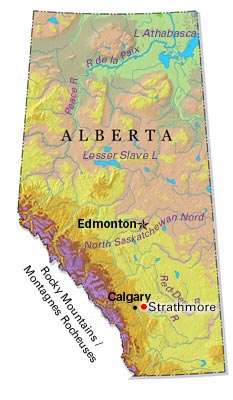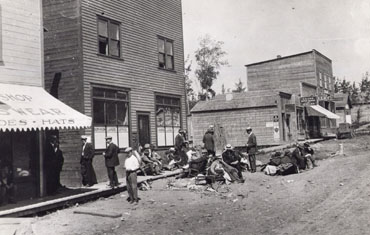Hanna, Alta, incorporated as a town in 1914, population 2673 (2011c), 2847 (2006c). The Town of Hanna is situated 219 km northeast of Calgary and was named after David B. HANNA, 3rd vice-president of the Canadian Northern Railway, and was first settled in 1912. As a Canadian Northern divisional point, it had a 10-stall roundhouse, built in 1913, and excellent connections to Saskatoon and Calgary. Wheat, subject to the booms of the 1910s and late 1920s and the busts of the mid-1920s and 1930s, and cattle have made Hanna the main service centre for the shortgrass country of Alberta. Today's resources include thermo-coal, clay, sand/gravel, petroleum, natural gas and bentonite. Hanna is the subject of the 1946 sociological study by Jean Burnet, Next-Year Country: A Study of Rural Social Organization in Alberta (1951).
-
- MLA 8TH EDITION
- Pannekoek, Frits. "Hanna". The Canadian Encyclopedia, 04 March 2015, Historica Canada. development.thecanadianencyclopedia.ca/en/article/hanna. Accessed 21 February 2026.
- Copy
-
- APA 6TH EDITION
- Pannekoek, F. (2015). Hanna. In The Canadian Encyclopedia. Retrieved from https://development.thecanadianencyclopedia.ca/en/article/hanna
- Copy
-
- CHICAGO 17TH EDITION
- Pannekoek, Frits. "Hanna." The Canadian Encyclopedia. Historica Canada. Article published March 30, 2008; Last Edited March 04, 2015.
- Copy
-
- TURABIAN 8TH EDITION
- The Canadian Encyclopedia, s.v. "Hanna," by Frits Pannekoek, Accessed February 21, 2026, https://development.thecanadianencyclopedia.ca/en/article/hanna
- Copy
Thank you for your submission
Our team will be reviewing your submission
and get back to you with any further questions.
Thanks for contributing to The Canadian Encyclopedia.
CloseArticle
Hanna
Article by Frits Pannekoek
Published Online March 30, 2008
Last Edited March 4, 2015

 Share on Facebook
Share on Facebook Share on X
Share on X Share by Email
Share by Email Share on Google Classroom
Share on Google Classroom


